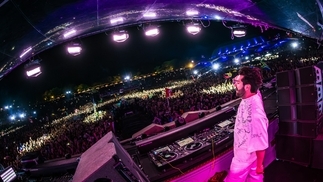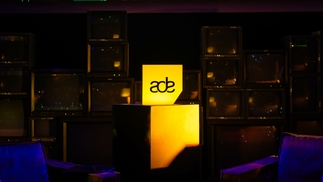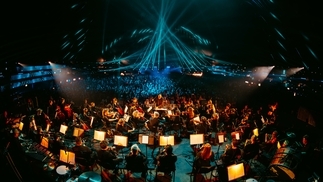MADE ON ADVENTURE
Youth and popularity - the fabric that makes up today's music industry. Enter Madeon, he's young, he's popular. Yet, in our five-hour conversation with the French artist he defies shallow norms and proves his career will be long-lasting and filled with adventure...
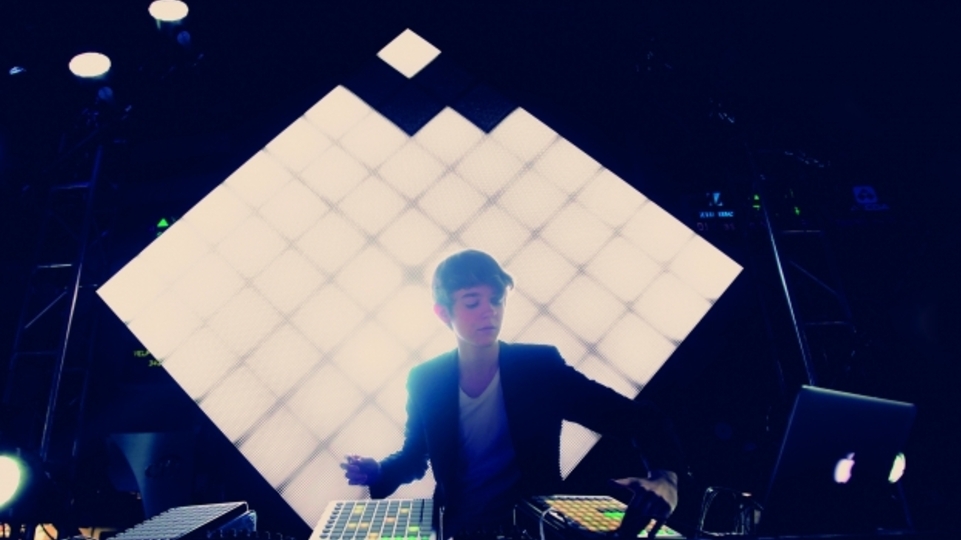
In under 10 minutes of speaking to Hugo Leclercq, the man behind the construction known as Madeon, it is clear the musical phenom is, inarguably, one of the most intelligent people you have ever come across. This is notwithstanding his age, which is a mere 20 years—old by music industry standards according to Madeon, middle aged, in fact—he is smart by all accounts. He confounded the intelligence tests administered at school. His vice of choice is sleep deprivation.
His British-inflected English (which he taught himself) is impressively fluent, considering his mother tongue and place of residence is France—the coastal town of Nantes, to be exact. He is articulate with an extensive, highly descriptive vocabulary. You could ask Madeon the most basic question and receive a detailed explanation in response. This will go in any number of directions, so much so that you forget your question. But not Madeon, who never loses the thread of the point he is making.
This is just one of the ways Madeon is in control. From long before the general public became aware of him, prior to even his first musical incarnation as Deamon (from which he derived Madeon), he has had a grand scheme with many components—the word he falls back on more than any other. Anything you have heard, seen, thought, or felt about Madeon has more than likely been masterminded by him, you just don’t know it. For the duration of our five-hour conversation, he purposely doesn’t let me see him, claiming he doesn’t have a computer camera.
This deflects my attention away from his babyface and slight build Google Images has yielded, where he looks like he’s 12 not 20. What does happen is I am far more focused on what he’s saying, which was his intention all along. Madeon is about speaking more than showing, Twitter over Instagram.
On 'Pop Culture', the track that catapulted him into the electronic music stratosphere, however, all you see of Madeon are his hands working the multi-colored lit button of the Novation Launchpad. The three minutes and change track is a 39-song mash-up, all of which are listed alphabetically (which is also their order of appearance) below the video.
To date ‘Pop Culture’ is almost at 28 million views. The upload of ‘Pop Culture’ was a strategic move by Madeon who based his timing on previous viral videos he had experimentally uploaded to optimize it and test public reaction.
“I had just turned 17 so I was very young and I didn’t want that to be a thing,” says Madeon of the video. “If you base your career around, ‘Look how young I am,’ someday you’re not going to be young anymore. It was important to find ways to divert the attention.
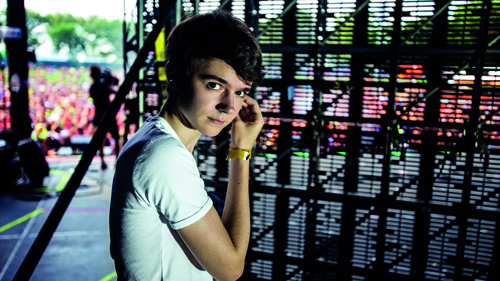
I created an identity that was sustainable in a way that youth is inherently not.”
Visuals are a huge source of inspiration for Madeon. He attributes this in part to his introduction to music: Daft Punk’s ‘Interstella 5555’, the animated film accompaniment to their album, ‘Discovery’. He writes music to a pitch that could be an idea, an emotion, a mood, a concept, which is visual more often than not.
Collecting images, he sorts them into categories such as “happy”, “turquoise”, “beautiful”, “uplifting”, “angry”, “dark”, “obscure”. When writing he’ll select images that translate what he wants the sound to be like and what he feels it is like already. He refers back to the images regularly during the writing process as way to remember what the song is about.
“When you see a painting, you take it all in at once, then you look at it directing your experience of it,” he explains. “With music you have the opportunity to build the experience in all the time. You have a layer that is deeper than temporal art. I try to see how I can put emotions that I find elsewhere into the format of music.
When you work on something for a very long time, you can become desensitized to its initial emotion. Looking at those images brings me back to what I felt when I started and what I wanted it to be about.”
Prior to writing the first note for his highly anticipated debut album, ‘Adventure’, Madeon had the structure laid out. This includes the hidden messages attached to an ongoing story he has coded in all his output, for which his diehard fans compulsively look. He knew he wanted to start 'Adventure' happy and childish and social and fun and video game-like with ‘You’re On’ and ‘OK.’ He knew that would transition to more intimate and solitary with ‘La Lune’ and ‘Beings’.
He knew ‘Imperium’, the halfway mark track, was going to be angry and driving, indicating the start of part two of the album. He knew he was going to end on an epic, widescreen tone by exploring that feeling in three different ways with ‘Innocence’, ‘Pixel Empire’, and ‘Home’. If you don’t recognize a vocal (‘Beings’), or two (‘Zephyr’), or three (‘Home’), on ‘Adventure’, that’s because Madeon has very ably taken the microphone on those himself.
“With production there are two phases: the inspiration phase, which is triggered by various experiences, traveling and taking it all in; and the production phase, which is more technical,” says Madeon. “I try as much as I can to remember how I felt when I had a spark of inspiration so even when I stop believing in the track I have to finish it, I remember there was a point where it felt really good to me.
I know that feeling can go out and back in, but if it never was there, it’s unlikely it is ever going to come. I never want to start something cynically without that fuzzy feeling of making something that’s meaningful to me.”
Much like everything else he knows how to do, Madeon learned how to make music sitting at his computer. He studied songs and tried to replay them on the piano or determine what they had in common as a way of understanding chord progression. Through patterns is how his knowledge of mechanisms of music developed.
His goal was to teach himself production until he was 18 so he could do it professionally—particularly since he intentionally flunked out of school and left when he was 16 so he would have no option but to succeed at music. His father was supportive and confident in his son’s decision, his mother anxious and not as understanding. The combination of the two is what took him over the edge.
He told his parents he was going to go for the equivalent of a French GED but instead, he entered, and won, the Pendulum remix contest for ‘The Island’. His parents hosted a number of British music executives (including Pete Tong who got treated to a homemade lunch) that paraded through their home looking to sign their not-yet-legal-son.
Madeon had his publishing deal by age 16 and his major label deal the following year. Through his “popcultur” imprint he licenses his material, and in this way maintains control over his creations. He produced Ellie Goulding when he was 17, Lady Gaga when he was 18, Coldplay when he was 19.
Although he is at ease in big city studios, the majority of ‘Adventure’, was created in the same studio he’s had for the last 10 years in his parents’ home, where he still lives. He spent time in fancy studios working on some of ‘Adventure’s collaborative songs with Foster The People’s Mark Foster, Passion Pit’s Michael Angelakos, Bastille’s Dan Smith, Kyan and Aquilo.
But he prefers the continuity and comfort of his home studio, which is conducive to execution and completion. Plus, his mother is on hand with regular feedings.
Having said that, Madeon is careful not to fall prey to reflexes or habits—no matter how tempting. Previously, his hope was that he would be able to wake up and be so comfortable with production he could execute something good every time.
Upon realizing that was good for the technical side of creations but not for the artistic side, he now searches for friction, challenge, frustration, something to happen that is outside of his control.
“What keeps me going is a feeling I get when I reach a point where a projects feels greater than me,” he says. “I have 15-20,000 songs on my phone including some really bad albums. Those albums give me a glimpse at a destination I will be heading towards if I’m not careful. Those albums remind me I need to always be true to myself and never stop seeking that magical moment.”
This translates to his other forms of self-expression: artwork, videos (he writes the scripts), visuals (he comes up with the concept, commissions, then does the edits), his live show (which is now expanded for ‘Adventure’), and DJing, all of which he gets to experiment with through the medium of Madeon. He programs the visuals for his live show to react to what he does so if he changes what he is playing, the visuals match up accordingly. This allows him to improvise, but still have a very tight-looking show.
DJing, which is not something that interested Madeon when he started making music at 11, is now his favorite hobby. The whole club and party aspect of electronic dance music was an unknown to him. His focus was on the tool and language of dance music to make songs. Still, he held down a monthly residency at the Wynn’s XS, Surrender, and Encore Beach Club in Las Vegas for two years from 2013 through to 2014. Plus he has spun at every major festival and club across the globe, not to mention opening for Lady Gaga on her Born This Way Ball tour.
“I never decided to be a DJ, it just happened,” he says. “When it started happening I wanted to make sure I became interesting enough as a DJ so I always feel good about myself doing it. I imagine in my head what my favorite way of DJing would be and I try my best to get as close to that experience as possible.”
Equating DJing with playing a video game, Madeon takes care to provide his audience with a dynamic performance. He has created a custom set-up using Ableton and Bome MIDI Translator Pro. With this he can navigate folders, load tracks, create mash-ups on the fly, taking elements from different songs and putting them together with a couple of buttons.
Clubs and festivals aren’t where you’ll find Madeon doing his real socializing. He has had the same two close friends for over 10 years whom he sees regularly. Even so, he was removed from the social aspect of school since he was so resistant to the whole experience.
And now, he is still removed from the experiences his friends are having. They are going to college, working at their first jobs, trying to make ends meet and bonding over it all—none of which includes Madeon who already owns investment property and whose music is almost as sync-friendly as Moby’s. But he has turned down significant gigs to spend a night watching movies with friends in order to maintain those relationships.
Despite his separation from his one-time peers, Madeon is remarkably well adjusted. Yes, he was partially raised by a computer (a fact he confirms), but he is very socially adept in the real world. What he missed out during his school years he made up for while touring. He may have felt out of place at school, but in a music setting, where his skills are apparent and he has a level of validation, he gained confidence and a sense of belonging.
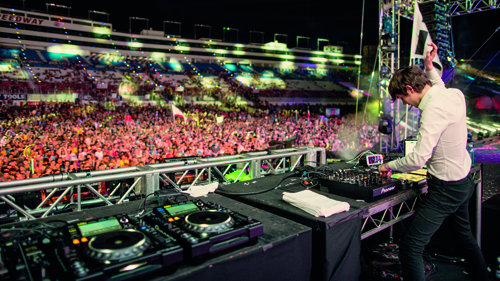
Madeon is equally at ease in the virtual world. He has the requisite hundreds of thousands of followers, likers and subscribers to his social networks, befitting his exalted musical status. And of course all the communication is directly from him. One of his fans had a photo montage of one of his tweets tattooed on her ribcage so now he’s concerned about his tweets ending up inked on people’s bodies permanently. Then there’s the couple that named their baby Madeon.
“I care about an audience that is not there because they want party music,” he says. “I feel like I have a smart, creative fanbase that connect to what I do in the way I want them to connect with it. I’m in phase and in line with the perception of my music from other people. That’s really pleasant. I love all the fan art I get sent and people making things inspired by what I do.”
This computer attachment came early for Madeon who quickly found it was the best tool for creation. From when he was very young, whenever he found something he loved, he wanted to make it himself. So he would try it: video games, novels, magic tricks, eventually leading to music. Storm was his first piece of music production software and then FL Studio, which he uses to this day and has spent more time looking at than any other activity in his life making it part of his brain in a deep way.
It features largely in his studio now, which also has the expected Novation items, some synths, some guitars, some speakers, a small vinyl collection, video games he will never have the time to play, a bookcase of French literature and music business tomes, as well as a whiteboard with a to-do list and plans and solutions to the aforementioned hidden messages. Plus two shrines: one to the Beatles and one to Daft Punk, at which he worships equally.
Madeon doesn’t have Beatles and Daft Punk albums on regular rotation, just the opposite. As with any art form that is meaningful to him, he is careful to protect its power by only listening to their music in the right setting, both emotionally and physically, enhancing the value of the songs in the process.
Instead of downloading the Beatles’ back catalog, he saved his allowance for six weeks at a time to buy one tangible album at a time, carefully listening to it numerous instances until it became part of his psyche. The mythology Daft Punk has created separate from their actual being appeals to Madeon’s artistic control side.
“I’m not star-struck because when you’re a superfan of anyone, you feel like you know them already,” says Madeon who has not yet met Daft Punk or any living Beatle. “The Beatles have a casual outlook on their achievements and a wisdom unmatched by similar legendary musicians that is mindblowing to me.
Meeting Daft Punk would be the scariest experience of my life. They always know what they are doing. They have a flawless, unstained career. If I were Daft Punk, I would hate everything that is not Daft Punk. For me not to meet [both bands], at least for a minute would feel like a romantic comedy with two hours of tension and nothing happening in the end. I want my life to be as satisfying as cheesy movie.”
words: LILY MOAYERI pics: ANDREW RAUNER
